A Comprehensive Analysis of Curriculum Development Theories & Models
VerifiedAdded on 2023/06/12
|24
|1787
|397
Report
AI Summary
This report provides a comprehensive analysis of curriculum development theories and models, focusing on the contributions of Ralph Tyler and Hilda Taba. It explores key components of curriculum development, including needs assessment, objective formulation, content selection, and evaluation. The report delves into learning theories such as behaviorism, constructivism, and humanism, examining their influence on curriculum design. It also discusses the three facets of curriculum—goals and purposes of education, curriculum as content, and curriculum as process—and evaluates the strengths and weaknesses of product-objective and process-discovery-based models. The conclusion emphasizes the importance of curriculum development theories in enhancing organizational effectiveness and references scholarly works to support the analysis. Desklib provides access to similar solved assignments and resources for students.
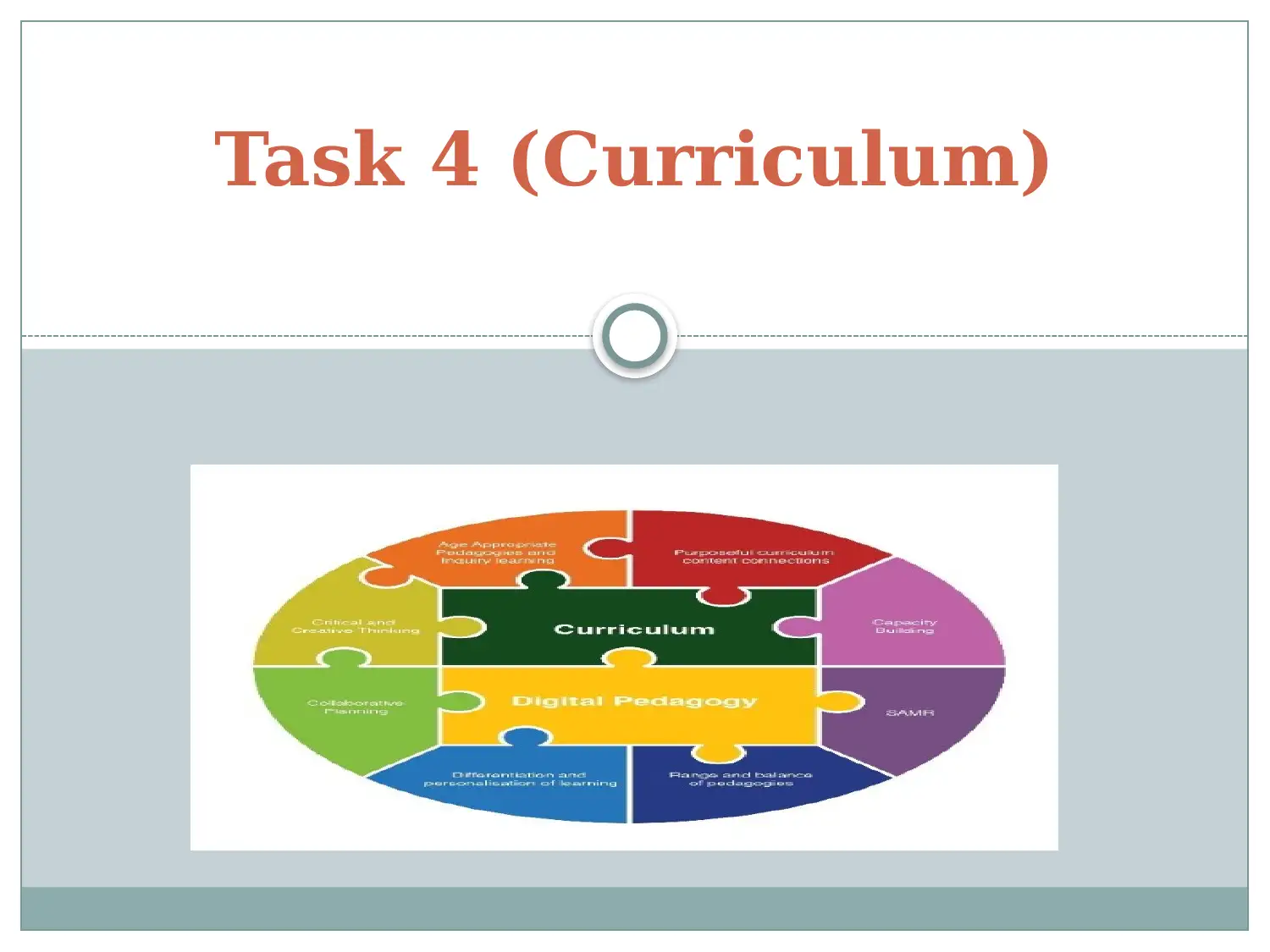
Task 4 (Curriculum)
Paraphrase This Document
Need a fresh take? Get an instant paraphrase of this document with our AI Paraphraser
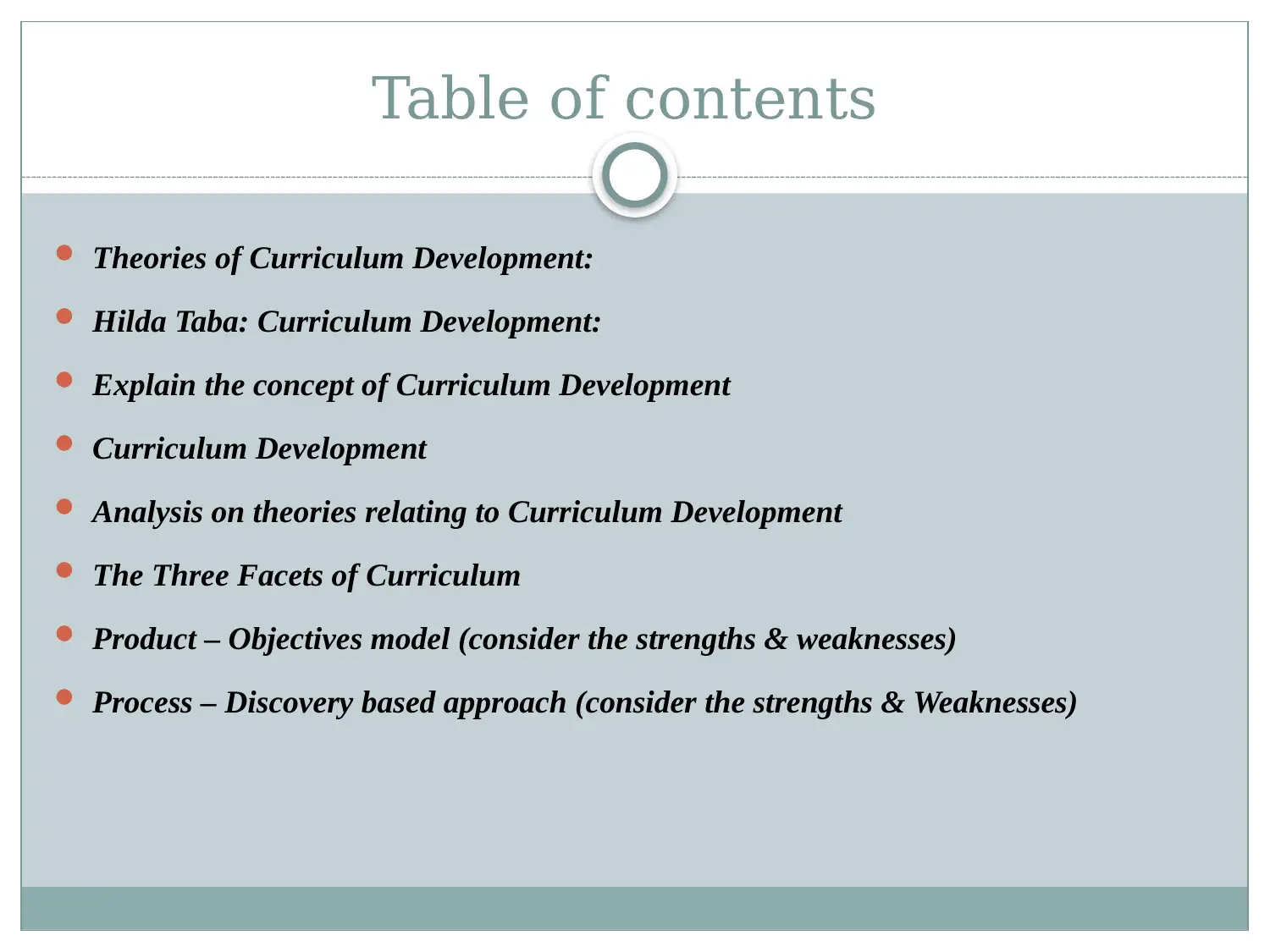
Table of contents
Theories of Curriculum Development:
Hilda Taba: Curriculum Development:
Explain the concept of Curriculum Development
Curriculum Development
Analysis on theories relating to Curriculum Development
The Three Facets of Curriculum
Product – Objectives model (consider the strengths & weaknesses)
Process – Discovery based approach (consider the strengths & Weaknesses)
Theories of Curriculum Development:
Hilda Taba: Curriculum Development:
Explain the concept of Curriculum Development
Curriculum Development
Analysis on theories relating to Curriculum Development
The Three Facets of Curriculum
Product – Objectives model (consider the strengths & weaknesses)
Process – Discovery based approach (consider the strengths & Weaknesses)
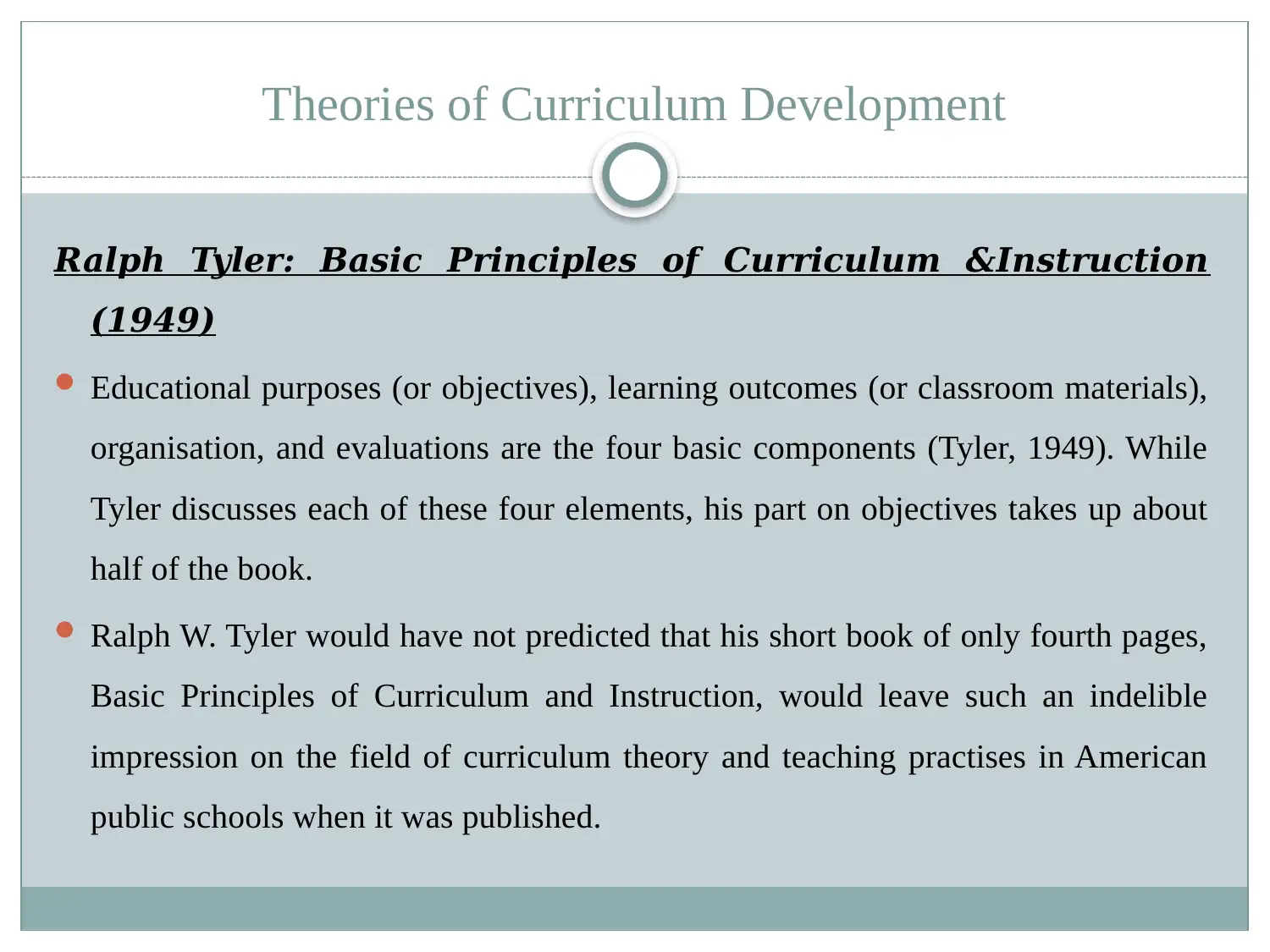
Theories of Curriculum Development
Ralph Tyler: Basic Principles of Curriculum &Instruction
(1949)
Educational purposes (or objectives), learning outcomes (or classroom materials),
organisation, and evaluations are the four basic components (Tyler, 1949). While
Tyler discusses each of these four elements, his part on objectives takes up about
half of the book.
Ralph W. Tyler would have not predicted that his short book of only fourth pages,
Basic Principles of Curriculum and Instruction, would leave such an indelible
impression on the field of curriculum theory and teaching practises in American
public schools when it was published.
Ralph Tyler: Basic Principles of Curriculum &Instruction
(1949)
Educational purposes (or objectives), learning outcomes (or classroom materials),
organisation, and evaluations are the four basic components (Tyler, 1949). While
Tyler discusses each of these four elements, his part on objectives takes up about
half of the book.
Ralph W. Tyler would have not predicted that his short book of only fourth pages,
Basic Principles of Curriculum and Instruction, would leave such an indelible
impression on the field of curriculum theory and teaching practises in American
public schools when it was published.
⊘ This is a preview!⊘
Do you want full access?
Subscribe today to unlock all pages.

Trusted by 1+ million students worldwide
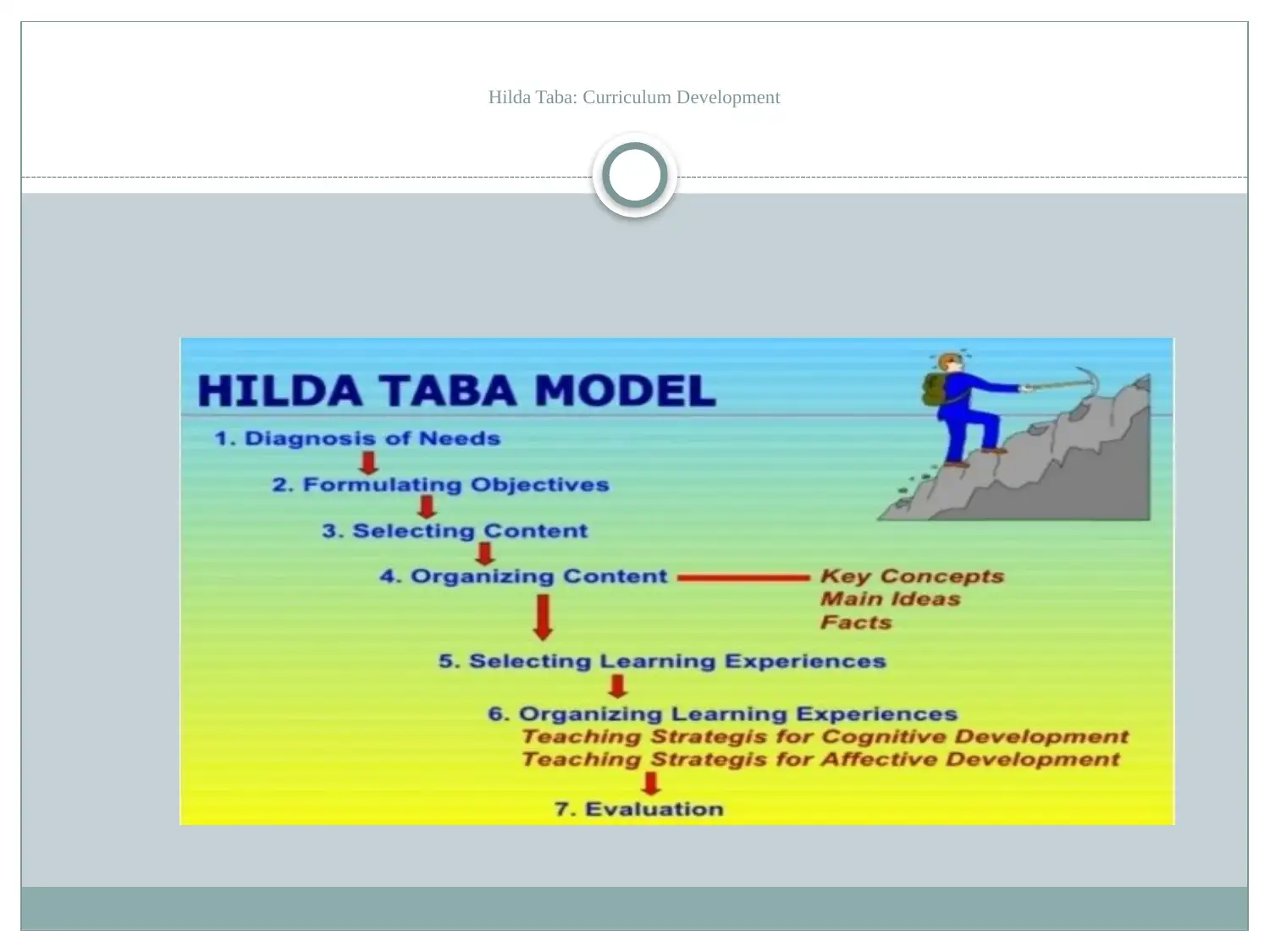
Hilda Taba: Curriculum Development
Paraphrase This Document
Need a fresh take? Get an instant paraphrase of this document with our AI Paraphraser
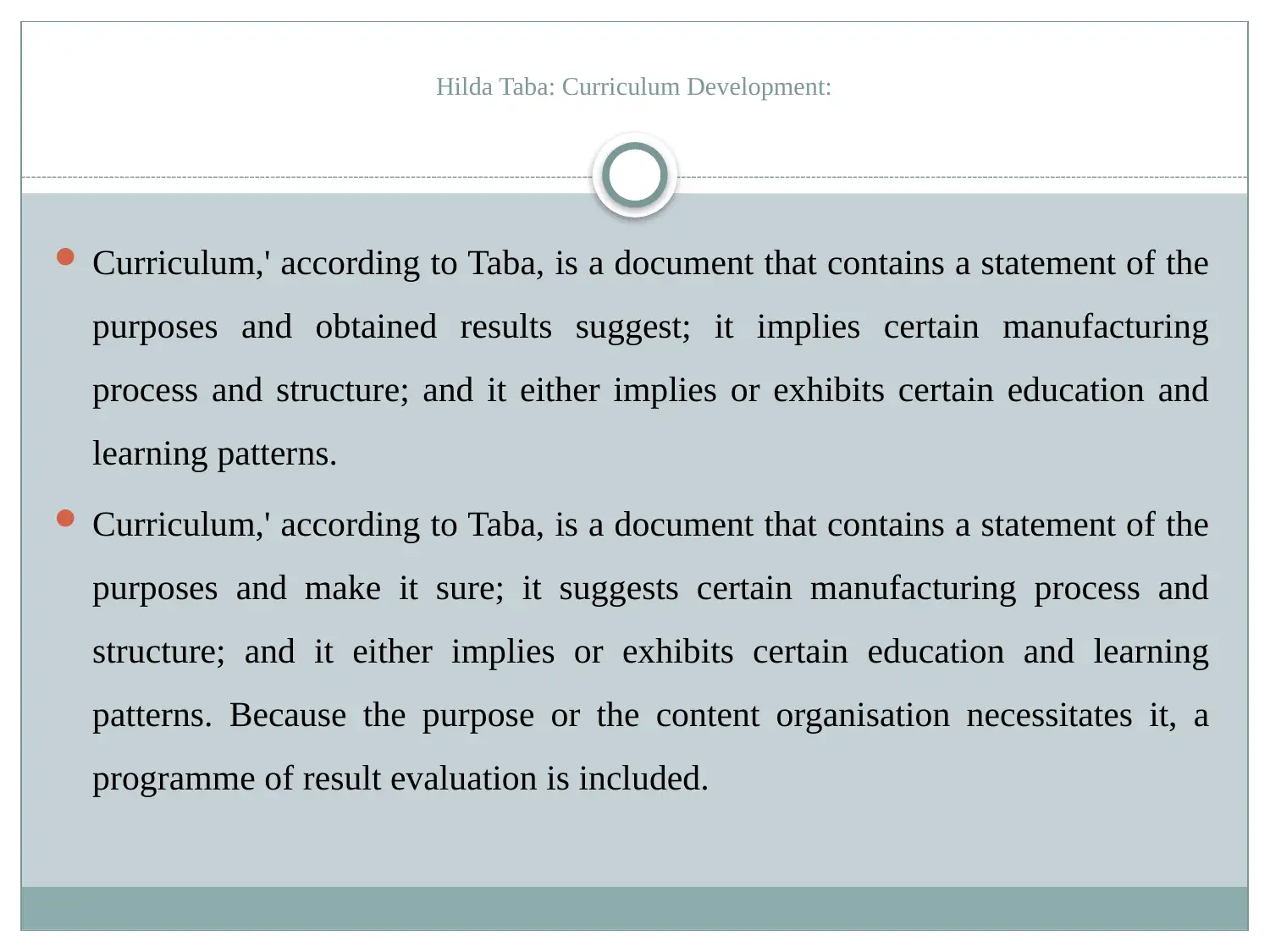
Hilda Taba: Curriculum Development:
Curriculum,' according to Taba, is a document that contains a statement of the
purposes and obtained results suggest; it implies certain manufacturing
process and structure; and it either implies or exhibits certain education and
learning patterns.
Curriculum,' according to Taba, is a document that contains a statement of the
purposes and make it sure; it suggests certain manufacturing process and
structure; and it either implies or exhibits certain education and learning
patterns. Because the purpose or the content organisation necessitates it, a
programme of result evaluation is included.
Curriculum,' according to Taba, is a document that contains a statement of the
purposes and obtained results suggest; it implies certain manufacturing
process and structure; and it either implies or exhibits certain education and
learning patterns.
Curriculum,' according to Taba, is a document that contains a statement of the
purposes and make it sure; it suggests certain manufacturing process and
structure; and it either implies or exhibits certain education and learning
patterns. Because the purpose or the content organisation necessitates it, a
programme of result evaluation is included.
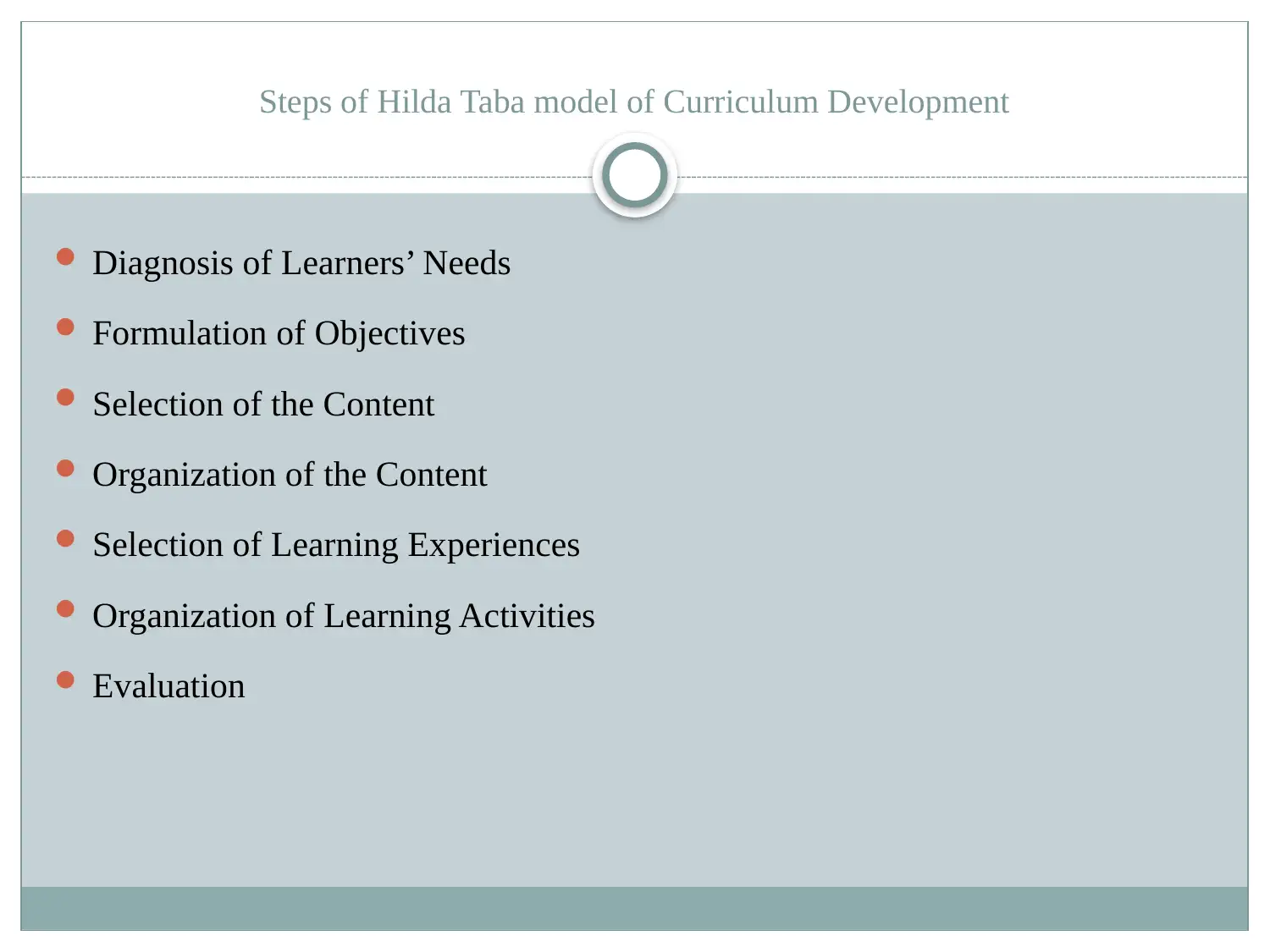
Steps of Hilda Taba model of Curriculum Development
Diagnosis of Learners’ Needs
Formulation of Objectives
Selection of the Content
Organization of the Content
Selection of Learning Experiences
Organization of Learning Activities
Evaluation
Diagnosis of Learners’ Needs
Formulation of Objectives
Selection of the Content
Organization of the Content
Selection of Learning Experiences
Organization of Learning Activities
Evaluation
⊘ This is a preview!⊘
Do you want full access?
Subscribe today to unlock all pages.

Trusted by 1+ million students worldwide
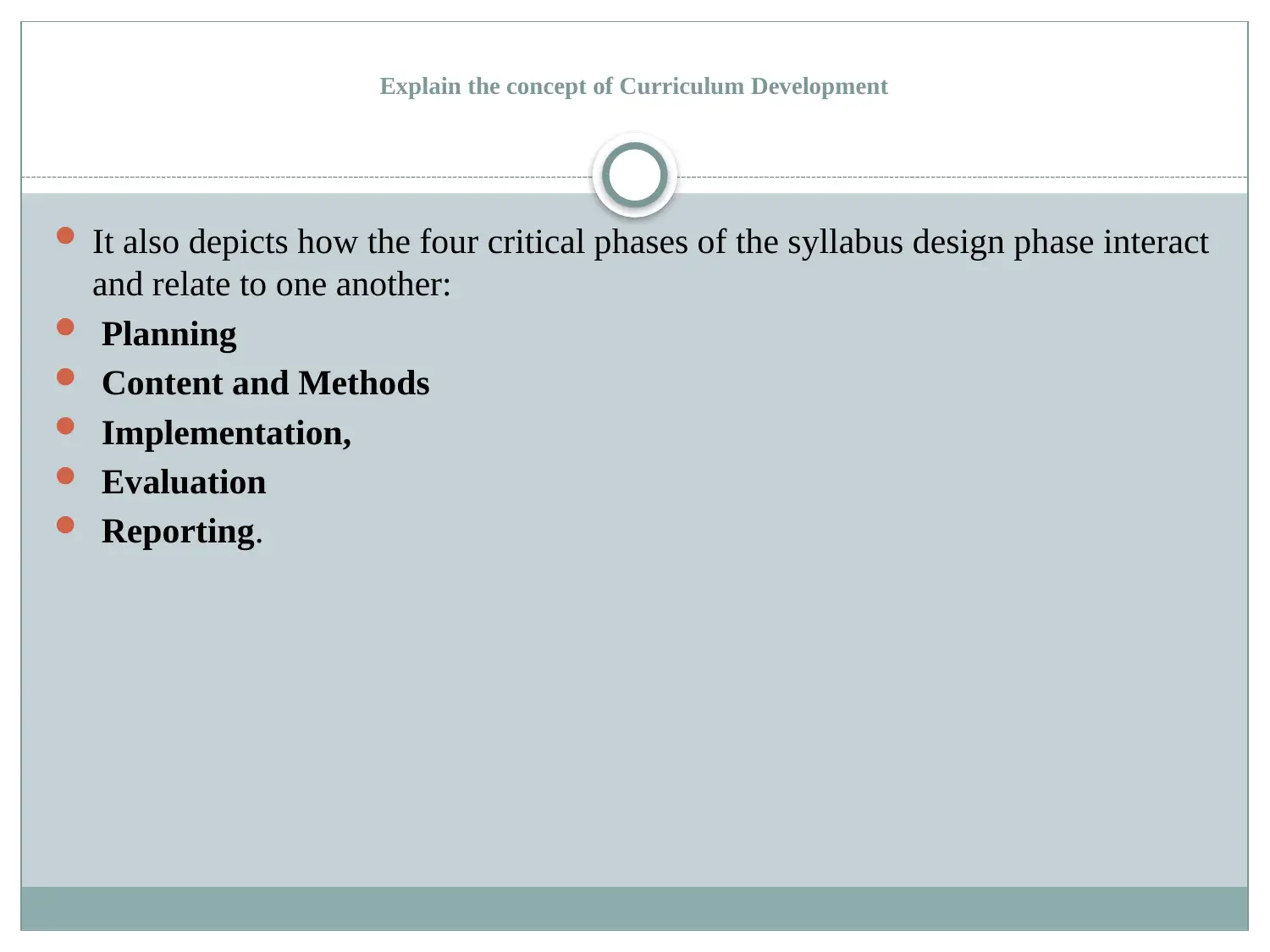
Explain the concept of Curriculum Development
It also depicts how the four critical phases of the syllabus design phase interact
and relate to one another:
Planning
Content and Methods
Implementation,
Evaluation
Reporting.
It also depicts how the four critical phases of the syllabus design phase interact
and relate to one another:
Planning
Content and Methods
Implementation,
Evaluation
Reporting.
Paraphrase This Document
Need a fresh take? Get an instant paraphrase of this document with our AI Paraphraser
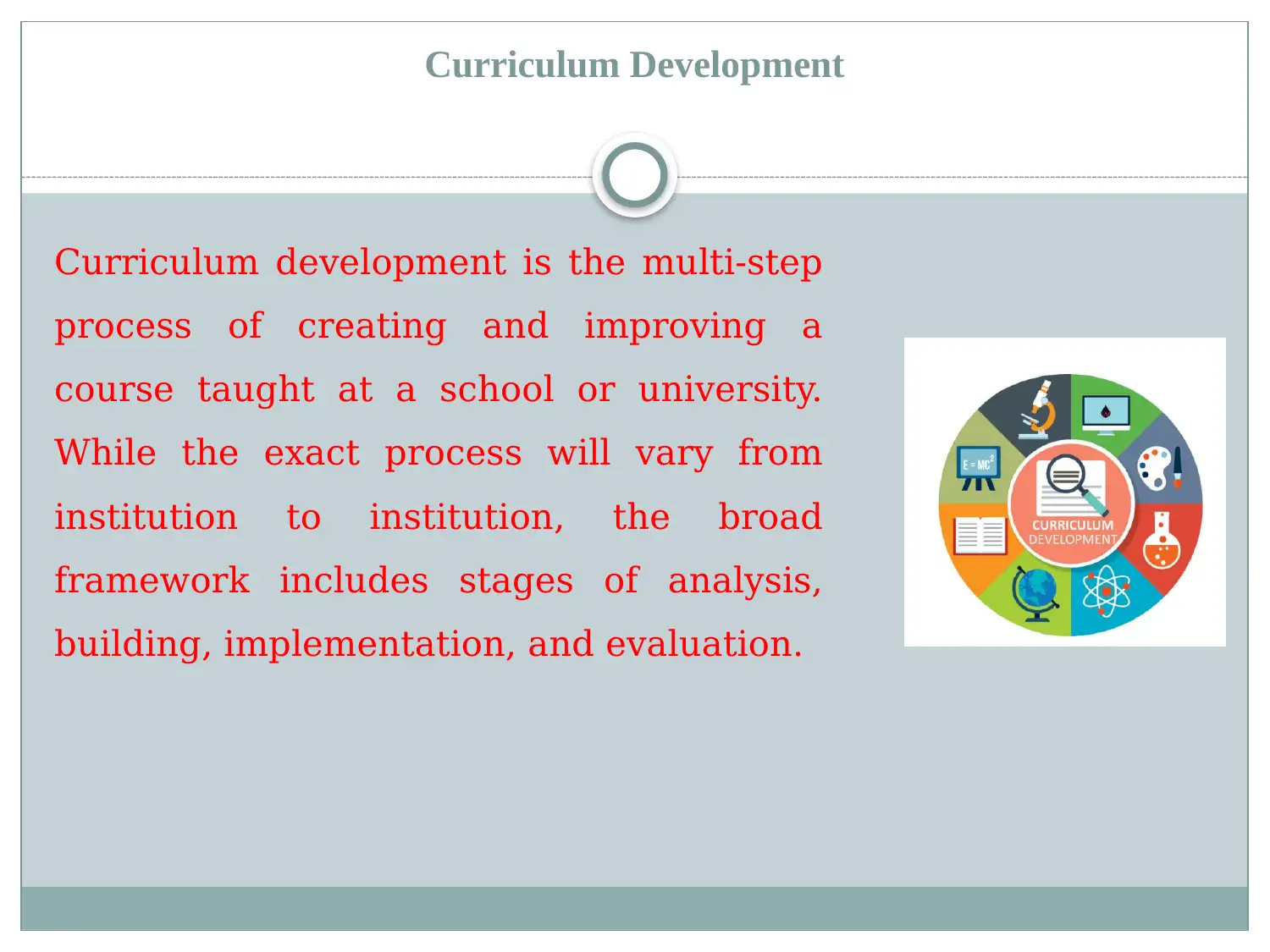
Curriculum Development
Curriculum development is the multi-step
process of creating and improving a
course taught at a school or university.
While the exact process will vary from
institution to institution, the broad
framework includes stages of analysis,
building, implementation, and evaluation.
Curriculum development is the multi-step
process of creating and improving a
course taught at a school or university.
While the exact process will vary from
institution to institution, the broad
framework includes stages of analysis,
building, implementation, and evaluation.
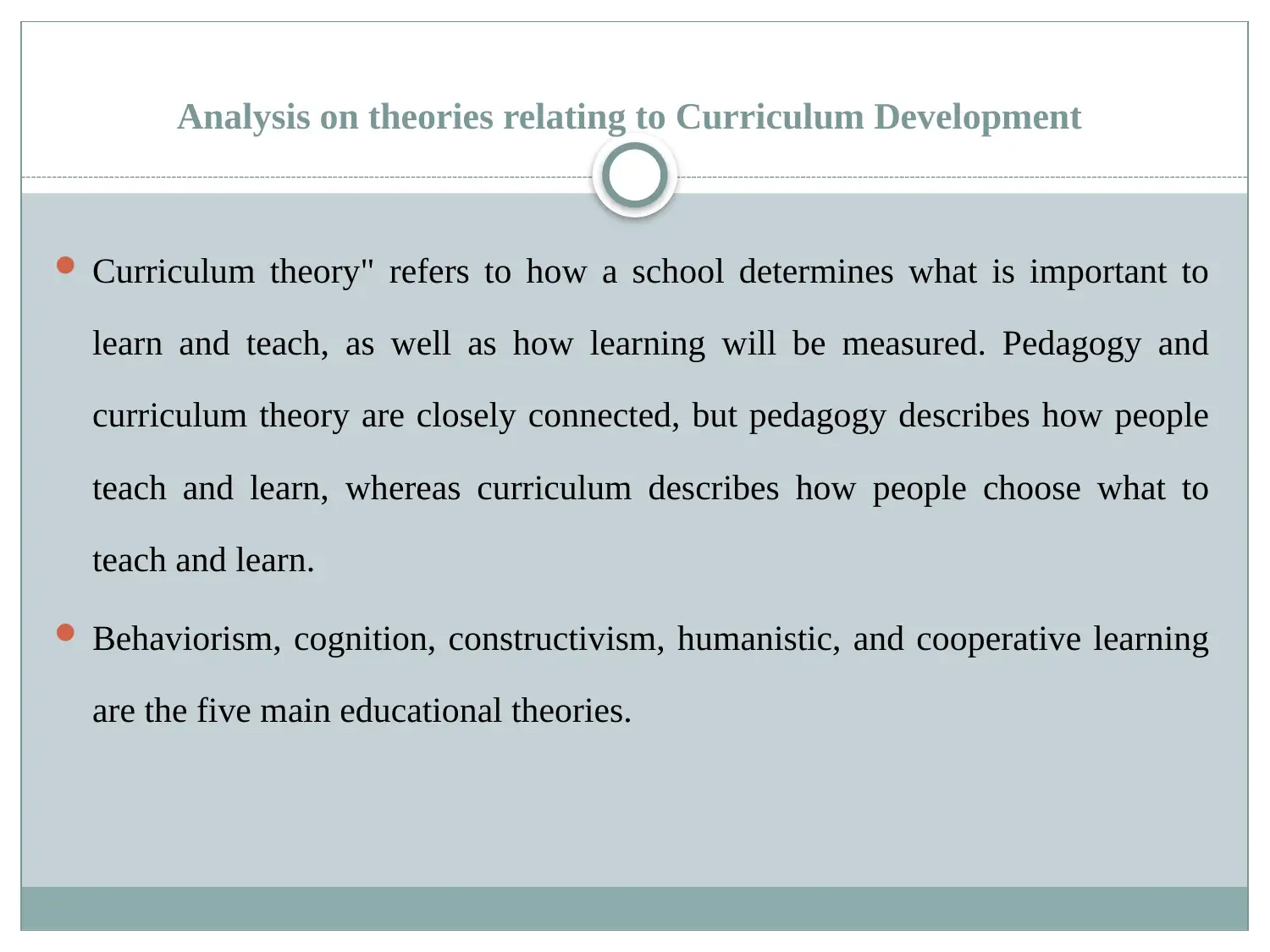
Analysis on theories relating to Curriculum Development
Curriculum theory" refers to how a school determines what is important to
learn and teach, as well as how learning will be measured. Pedagogy and
curriculum theory are closely connected, but pedagogy describes how people
teach and learn, whereas curriculum describes how people choose what to
teach and learn.
Behaviorism, cognition, constructivism, humanistic, and cooperative learning
are the five main educational theories.
Curriculum theory" refers to how a school determines what is important to
learn and teach, as well as how learning will be measured. Pedagogy and
curriculum theory are closely connected, but pedagogy describes how people
teach and learn, whereas curriculum describes how people choose what to
teach and learn.
Behaviorism, cognition, constructivism, humanistic, and cooperative learning
are the five main educational theories.
⊘ This is a preview!⊘
Do you want full access?
Subscribe today to unlock all pages.

Trusted by 1+ million students worldwide
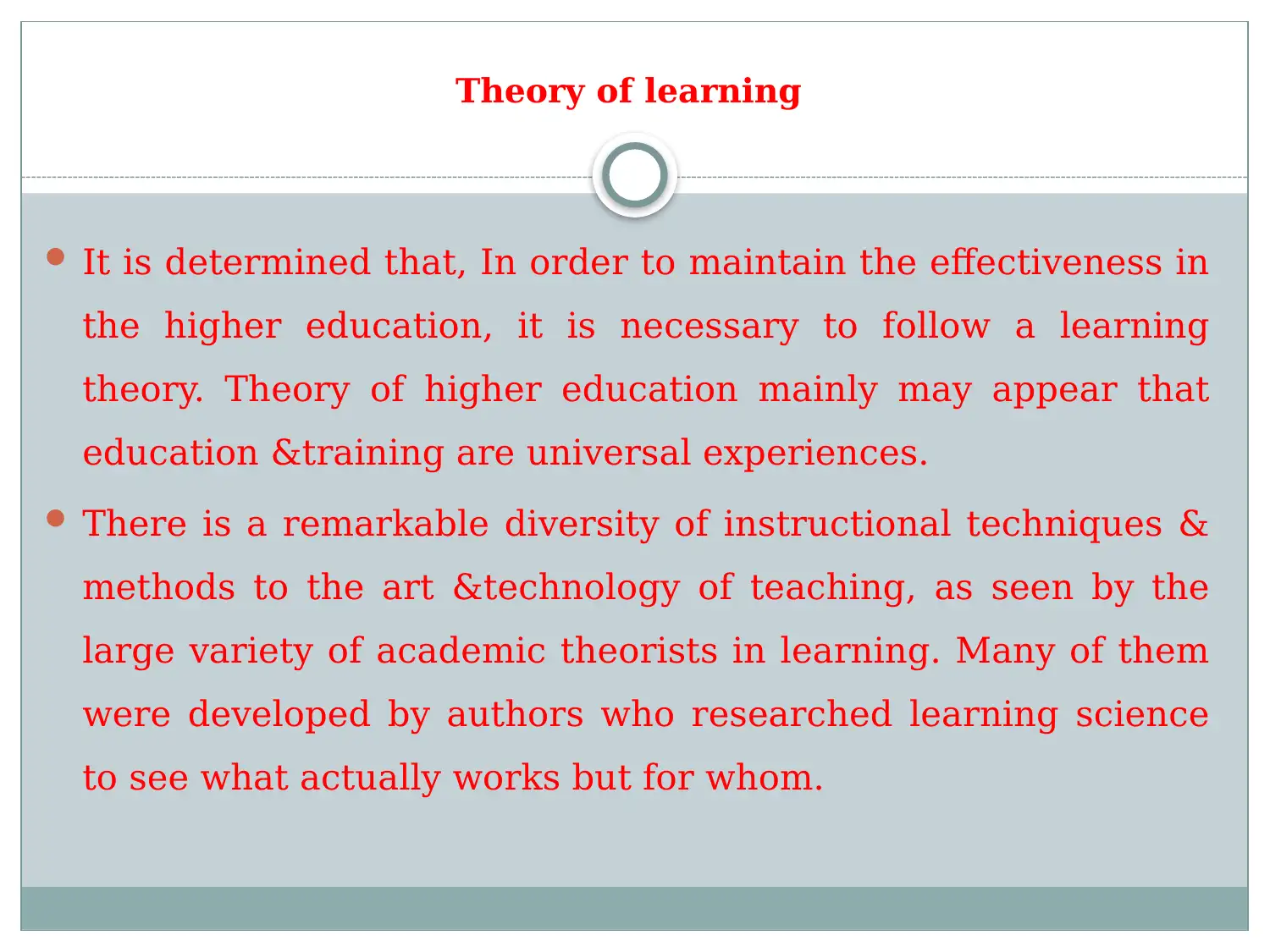
Theory of learning
It is determined that, In order to maintain the effectiveness in
the higher education, it is necessary to follow a learning
theory. Theory of higher education mainly may appear that
education &training are universal experiences.
There is a remarkable diversity of instructional techniques &
methods to the art &technology of teaching, as seen by the
large variety of academic theorists in learning. Many of them
were developed by authors who researched learning science
to see what actually works but for whom.
It is determined that, In order to maintain the effectiveness in
the higher education, it is necessary to follow a learning
theory. Theory of higher education mainly may appear that
education &training are universal experiences.
There is a remarkable diversity of instructional techniques &
methods to the art &technology of teaching, as seen by the
large variety of academic theorists in learning. Many of them
were developed by authors who researched learning science
to see what actually works but for whom.
Paraphrase This Document
Need a fresh take? Get an instant paraphrase of this document with our AI Paraphraser
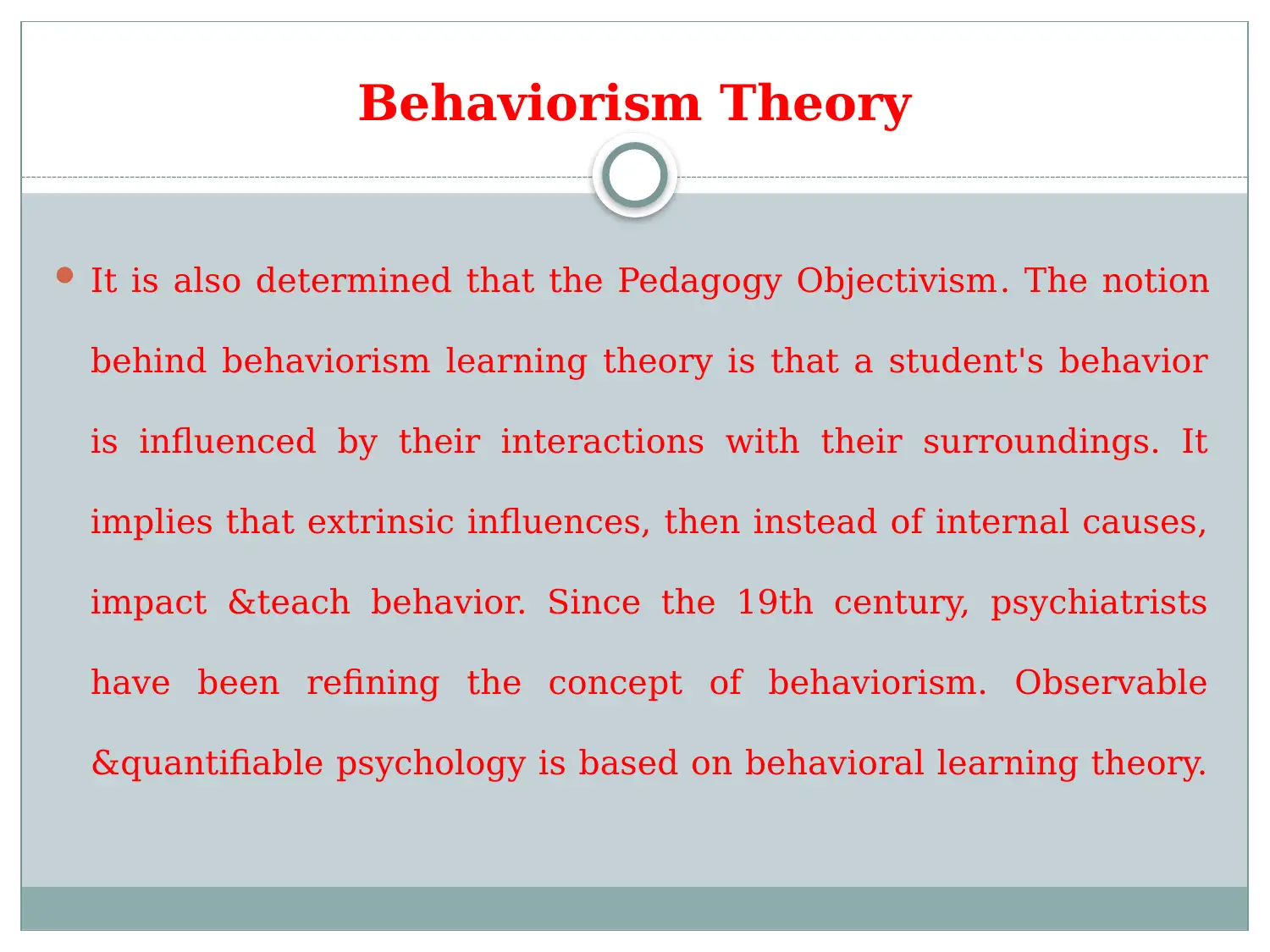
Behaviorism Theory
It is also determined that the Pedagogy Objectivism. The notion
behind behaviorism learning theory is that a student's behavior
is influenced by their interactions with their surroundings. It
implies that extrinsic influences, then instead of internal causes,
impact &teach behavior. Since the 19th century, psychiatrists
have been refining the concept of behaviorism. Observable
&quantifiable psychology is based on behavioral learning theory.
It is also determined that the Pedagogy Objectivism. The notion
behind behaviorism learning theory is that a student's behavior
is influenced by their interactions with their surroundings. It
implies that extrinsic influences, then instead of internal causes,
impact &teach behavior. Since the 19th century, psychiatrists
have been refining the concept of behaviorism. Observable
&quantifiable psychology is based on behavioral learning theory.
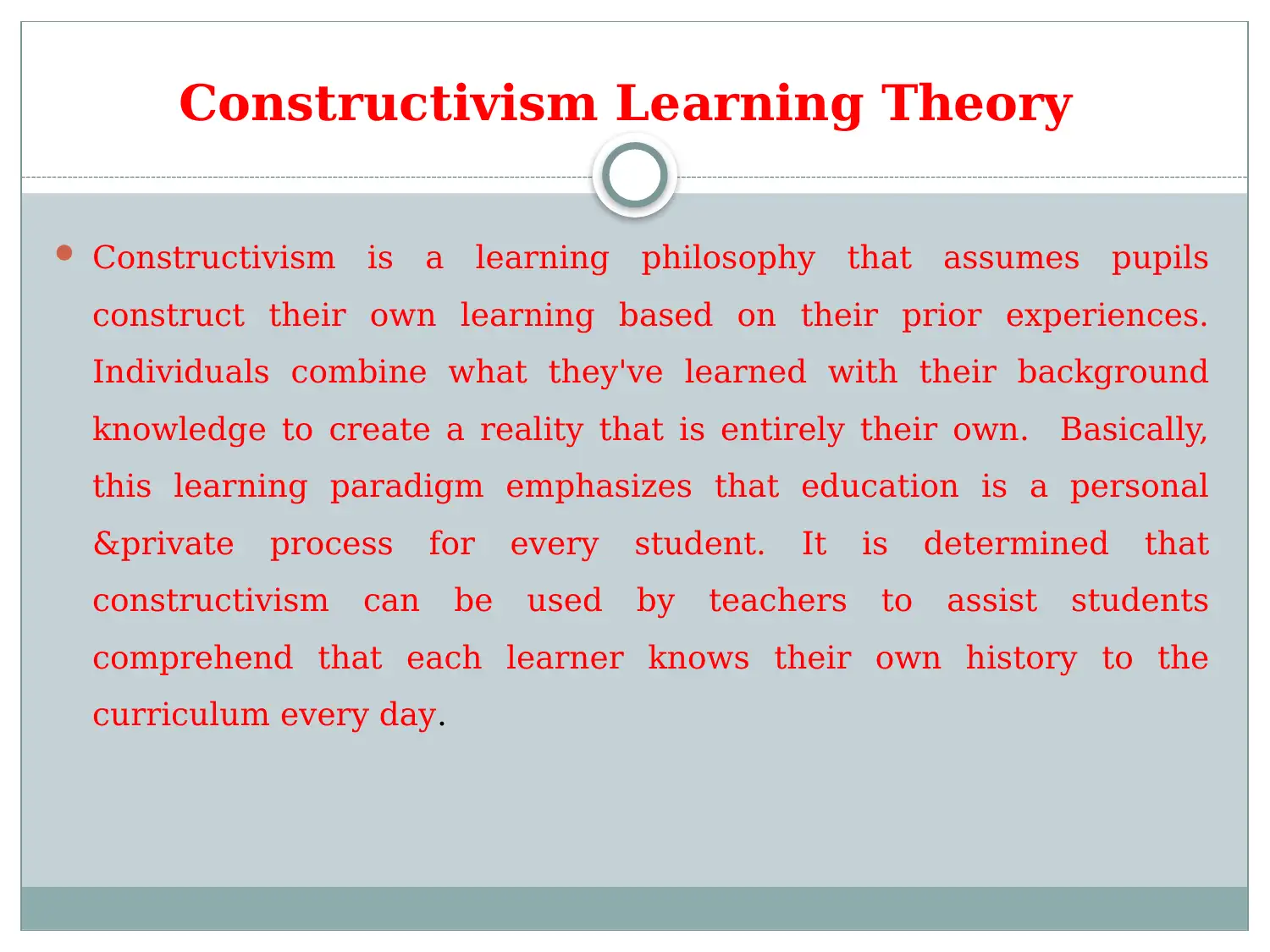
Constructivism Learning Theory
Constructivism is a learning philosophy that assumes pupils
construct their own learning based on their prior experiences.
Individuals combine what they've learned with their background
knowledge to create a reality that is entirely their own. Basically,
this learning paradigm emphasizes that education is a personal
&private process for every student. It is determined that
constructivism can be used by teachers to assist students
comprehend that each learner knows their own history to the
curriculum every day.
Constructivism is a learning philosophy that assumes pupils
construct their own learning based on their prior experiences.
Individuals combine what they've learned with their background
knowledge to create a reality that is entirely their own. Basically,
this learning paradigm emphasizes that education is a personal
&private process for every student. It is determined that
constructivism can be used by teachers to assist students
comprehend that each learner knows their own history to the
curriculum every day.
⊘ This is a preview!⊘
Do you want full access?
Subscribe today to unlock all pages.

Trusted by 1+ million students worldwide
1 out of 24
Related Documents
Your All-in-One AI-Powered Toolkit for Academic Success.
+13062052269
info@desklib.com
Available 24*7 on WhatsApp / Email
![[object Object]](/_next/static/media/star-bottom.7253800d.svg)
Unlock your academic potential
Copyright © 2020–2026 A2Z Services. All Rights Reserved. Developed and managed by ZUCOL.




